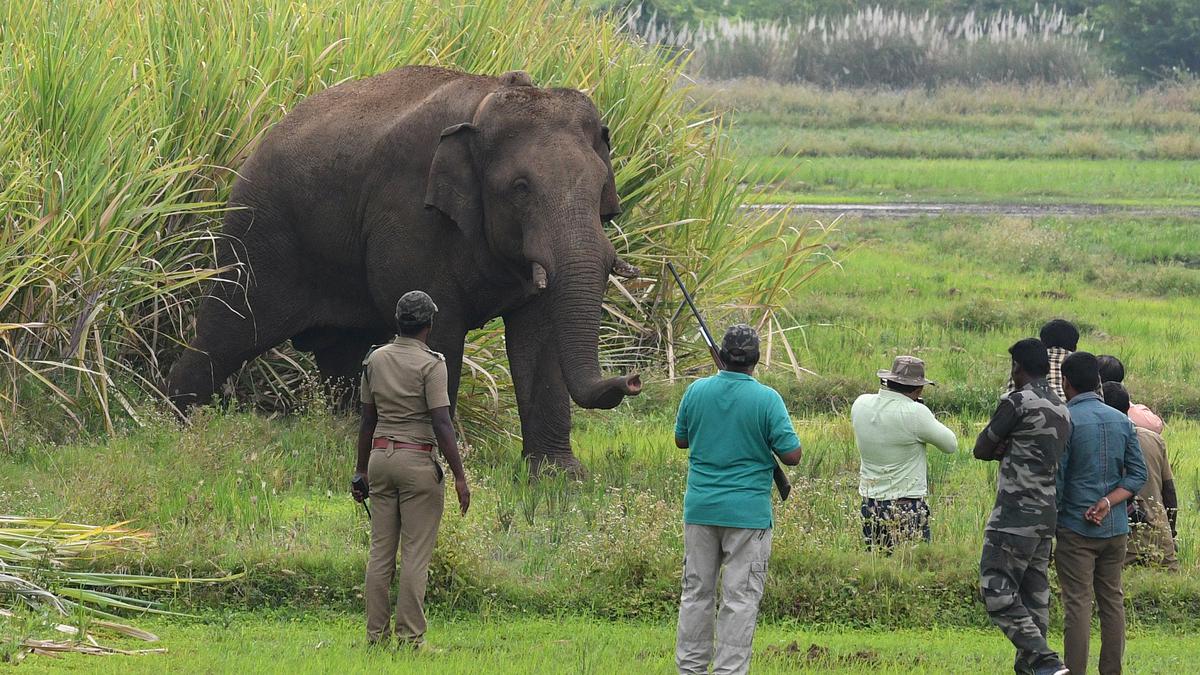
Elephants: the new raiders of rice shops
The Hindu
Raman Sukumar, who has studied jumbos for over four decades, calls this trend of elephants raiding shops a culturally transmitted behaviour that has to be addressed soon
Trader M. Ashok Kumar of Maruthapuram, a small village abutting the Maruthamalai foothills, some 10 km from Coimbatore in Tamil Nadu, was three weeks into running a ration shop in the locality when he encountered the most unexpected challenge.
ALSO READ Elephants in the room
The concrete roofed government building with a strong rolling shutter was never a target for theft in the past. But a ‘loot’ was reported at the ration shop on the night of July 22. When he stepped into the shop the following morning, he found rice scattered all over the verandah and torn jute bags. The intruder had taken the gunny bags after knocking down the rolling shutter, a break-in that no human could achieve. A thick layer of mud on the upper beam meant the trespasser had to bend to sneak into the shop. Kumar did not need any more proof to identify the intruder: an elephant had had a quick meal in the middle of the night.
“Around 500 kg of rice was lost,” he says. Kumar had taken over the shop on July 1 and the loss of half a tonne of rice in the third week was a big blow. Fearing further jumbo raids, he shifted his provisions to a rented space closer to the Coimbatore-Maruthamalai road, around 700 metres away from the old one. “Wild elephants raiding shops in the village was unheard of. Though they often pass through the road at night, they never targeted shops,” says an equally anguished U. Pooavarasan, who runs a grocery store close to the old ration shop.
Around 10 km away, in the 24 Veerapandi village panchayat, a herd of elephants had made a similar loot at the grocery store run by P. Giridharan in April. It was also the first instance of wild elephants damaging a shop in the village. The herd, comprising a calf, feasted on rice, jaggery, flour and ‘Ooty Varkey’ (a famed crispy puffed biscuit-like delicacy), recalls Giridharan.
In November 2019, the Tamil Nadu Forest Department had captured a tusker named ‘Arisi Raja’ (for his love of rice) from Arthanaripalayam, around 70 km from Coimbatore, and lodged him in a kraal. The elephant allegedly killed three people while straying into villages for rice and crops. ‘Arisi Raja’ is now a kumki, a trained tusker, renamed as Muthu.
Raman Sukumar, who has studied Asian elephants for over four decades, calls this trend of elephants raiding shops a culturally transmitted behaviour. “Elephants are coming into closer contact with human settlements and they are attracted by the smell of food. And sometimes elephants learn that if they break into a house, they get food. They start that kind of behaviour and other elephants learn from it,” he says. Though this behavioural change was very common in places such as Jharkhand, it has not been happening to that extent in the South except in a few places such as Valparai and Gudalur and in the case of elephants like Arikomban, a rice-eating tusker that was translocated twice.

BJP State unit president B.Y. Vijayendra has wondered why the IAS Officers’ Association, which has now petitioned Chief Minister Siddaramaiah against BJP MLC N. Ravikumar for allegedly derogatory comments against the Chief Secretary, did not show similar interest when Chief Minister Siddaramaiah himself had insulted an IAS officer earlier.





















 Run 3 Space | Play Space Running Game
Run 3 Space | Play Space Running Game Traffic Jam 3D | Online Racing Game
Traffic Jam 3D | Online Racing Game Duck Hunt | Play Old Classic Game
Duck Hunt | Play Old Classic Game










